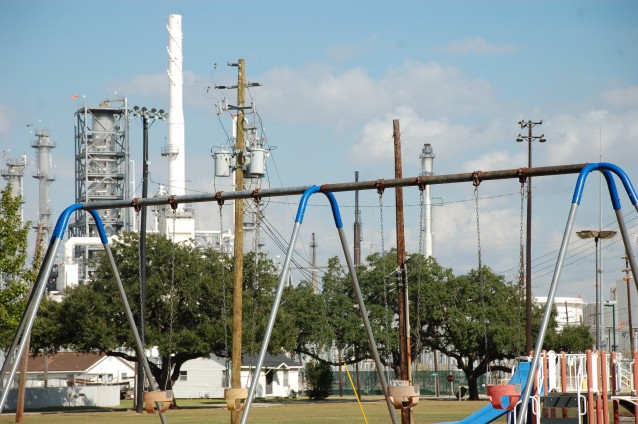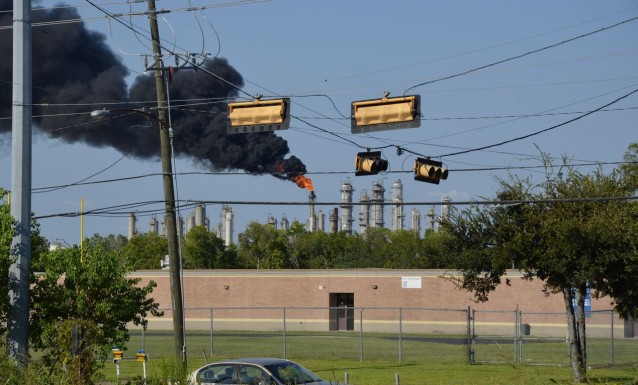MANCHESTER, TEXAS — Tell Gloria Trevino you like her house, and she’ll laugh right in your face.
“You like this?” she’ll say, glancing at her small one-story home with tall yellow flowers and six identical golden terriers on the inside of a chain-link fence. The house is lodged between huge industrial tanks of simmering molasses. “Yes, this is my palace!”
The smell surrounding the home is immediately apparent, like a pot of burning caramel. But Trevino says it’s actually another smell that bothers her. “Come back at night, or right after it rains — that’s when it gets really bad, really toxic-smelling,” she said. “That’s when they release all the chemicals.”
Her home in the Manchester neighborhood of East Houston, Texas is just two blocks from Valero oil refinery. She can’t know for sure if the smell is coming from the refinery, though, because her home and her community sit in the middle of Houston’s Ship Channel, the most productive oil and chemical refining industry area in the United States.
Coincidentally or not, people in Manchester and the surrounding areas are sick. Yudith Nieto, 25, an environmental justice advocate who has lived in Manchester most of her life, says her low-income, heavily Latino community has high rates of childhood leukemia, asthma, and bronchitis — and this includes her family members and friends. Her observation has been backed up by data from the Environmental Protection Agency and the University of Texas which found “unacceptable” levels of cancer-causing pollutants in Manchester’s air.
Nieto wants her elected officials to help them, whether it means stricter environmental controls on the industries, settlements for health injuries, or helping her family find a new place to live. She wants her politicians to oppose the Keystone XL pipeline, which would bring Canadian tar sands oil down to Houston and increase refinery activity in the area.
Most of all, she just wants someone to listen.
“It takes outsiders to come in here because our people won’t do it,” Nieto said. “No one here will do anything for us.”
Elections Silent On Environment
This year’s elections in Texas have barely touched on environmental issues. The governor’s race between Democrat Wendy Davis and Republican Attorney General Greg Abbott has been about government ethics, education, and Ebola. Texas’ 36th Congressional district includes parts of the Houston Ship Channel that plague Manchester, but the election for that seat has been about same-sex marriage, immigration and ISIS. The race for Texas’ 29th Congressional District — which includes Manchester — is an unchallenged race, and incumbent congressman Gene Green has so far mentioned nothing about industrial pollution.
And at the only debate between the candidates for Texas’ open U.S. Senate seat last Friday, there were no questions for either Republican Sen. John Cornyn or Democratic challenger Dr. David Alameel about environmental or energy issues in the state. Instead, the debate focused solely on immigration, health care, and Ebola.
“No candidate for office in Texas has put environmental interests at the forefront,” Diana Flores, a trustee of the Dallas Hispanic Chamber of Commerce, told ThinkProgress at the debate. “Oil and gas companies are buying them off and preventing things from getting done.”
Indeed, the companies that operate around Manchester have contributed thousands of dollars to the 2014 elections most important to Manchester, and millions to Texas elections in general. And there are a lot of big companies surrounding the neighborhood. Beyond Valero, there’s a Texas Petrochemicals plant to the immediate south; a Solvay fertilizer plant to the west; a Goodyear tire plant and a Lyondellbasell heavy-sulfur crude oil refinery to the southeast. Mounds of petcoke, a black, dusty byproduct of tar sands oil refining, are stored nearby at a facility owned by Kinder Morgan.
In their corporation lifetimes, Lyondellbasell, Kinder Morgan, Solvay, and Valero have contributed a combined $5.4 million to influence Texas elections, according to data compiled by Open Secrets and Follow the Money. Out of those, the biggest influencer has been Valero, which contributed a whopping $4.3 million of those lifetime donations.

To the political voices that would be important to Manchester, Valero has been generous. The company and its employees have given $44,750 to Cornyn for the 2014 election, and $102,950 since Cornyn began running for office. Valero only gave $5,000 to Green in this unchallenged election, but it has given him $52,500 since he took office. The company seemingly hasn’t given Texas Attorney General Abbott a dime in his race for governor, but it has contributed $215,212 to his political career overall.
Valero’s generosity likely stems from the fact that it may have a lot to lose if Manchester’s environmental activists are successful in getting what they want most — a halt on the Keystone XL pipeline. If the pipeline is approved, it’s been estimated that 90 percent of the 860,000 daily barrels of tar sands crude that would flow through it will be processed at refineries on the Houston Ship Channel.
Valero is one of the key companies expected to process a large percentage of that oil. And while it’s still unclear whether the oil will be processed at the Manchester plant, local activists want to make sure it never even gets the chance.
Ripple Effects In Manchester
While the Houston industry leader’s political contributions may be helping to dwarf political will on environmental issues during election season, it doesn’t mean environmental issues aren’t happening. There have been well-documented air quality problems in and around Manchester, which are contributing to an increased risk of cancer and illness.
The most recent data is from the EPA, which conducted a study of East Houston’s air in 2010 and found the presence of seven human carcinogens that posed an “unacceptable increased cancer risk,” including diesel particulate matter, chromium 6, benzene, and formaldehyde.
Because of this, Manchester’s local schools are ranked among the top one percent of the most polluted in the country. The children who go there are 56 percent more likely to get leukemia than those living more than 10 miles away, according to a University of Texas study.
The risk of an accident or explosion are greater there, too. According to the Center for Effective Government, the Manchester area holds 27 schools within a one mile radius of a high-risk chemical facility, putting 25,968 students in danger. Most of those schools are located in areas where 30 percent or more of the population lives below the poverty line.

On top of all that, Manchester is a disproportionately low-income, low-educated, minority community. More than 85 percent of its population is Hispanic, and less than 10 percent are white alone. Only seven percent have bachelors degrees, and while 40 percent of the community lives in a dual-parent household with children, the median household income is less than $40,000.
“There’s no coincidence as to why all these industries are allowed to be here,” Nieto said. “This is environmental racism, plain and simple.”
Perpetually Ignored
Even with all the community’s health and safety problems, Juan Parras, the director of the only environmental group based near Manchester, says he has been perpetually ignored by his elected officials. He’s met with Rep. Green many times, he said, but it’s usually a short meeting, and the conversations never get far.
“[Green] will say Juan, look, you know I support Keystone XL. Right off the bat he doesn’t want to listen to community issues,” Parras, the head of Texas Environmental Justice Advocacy Services (TEJAS) said. “It makes you feel like, well, all you care about is industry. You feel like you wasted all your time and money to go have a serious conversation and he only gives you three minutes.”
If the Keystone XL pipeline is approved, Parras and Nieto fear Manchester’s pollution issues will only get worse, as the refineries surrounding the community would begin processing heavy tar sands crude oil from the pipeline. That tar sands crude oil processing would also produce more of the dusty petcoke byproduct, which Parras and Nieto worry will also contribute to more health problems.
Parras said he’s brought these concerns to Houston Mayor Annise Parker, who is not up for re-election this year, and numerous city councilmembers. “They say it’s not a city issue, it’s a state issue,” Parras said. He admits he hasn’t reached out to Sen. John Cornyn, but only because he feels it would be a hopeless effort.
“His hands are tied with the industry,” Parras said. “It’s a waste of time and energy. There’s no way we’re going to change his mind.”
Representatives for Cornyn and Green did not immediately respond to ThinkProgress’ requests for comment.
For now, it’s up to those living in Manchester whether they want to change their minds about staying. After all, it’s a tight-knit community. Driving through town with Yudith Nieto, we stop a few times to catch up with her aunt and cousins, and once at her grandma’s house to pick up the mail. We drive by a field where kids in jerseys play soccer, and slow down to let tricycle traffic pass. “Everybody knows everybody,” Nieto says. “It’s a good place to be.”
For Gloria Trevino, whose house between the molasses tanks was paid off by the company, the decision on whether or not to move is even harder. If she stays, she could give the house to her children. And her health is fine now, though she does worry about the future.
“Do I get out now? Is it too late? Am I too old?” she wondered. “I don’t know. But living here, I don’t recommend it. The pollution’s bad.”
